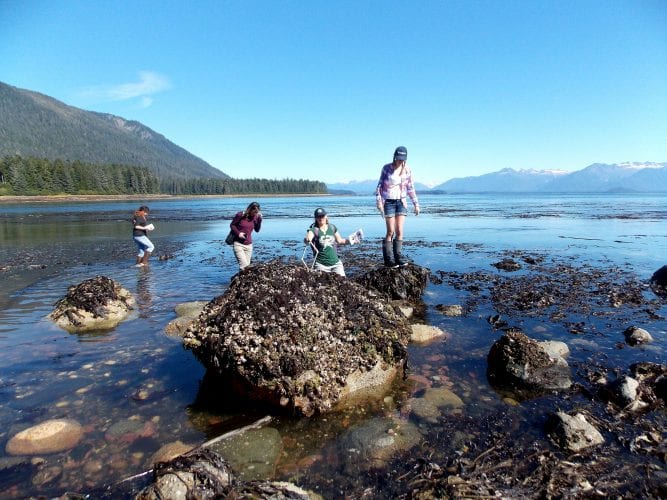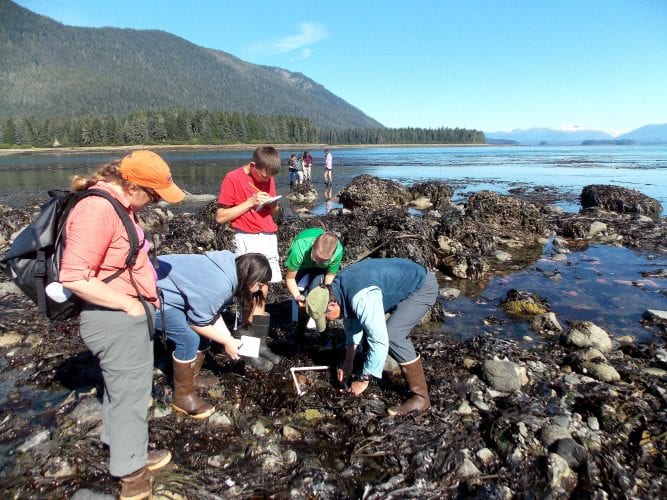It’s low tide at Hungry Point Beach and the ground is covered in rocks and brown and green slippery seaweed. Several students are huddling in a group, staring down at the ground.
“Oh, green urchin!”
Barry Bracken announces the find. He’s an adult volunteer in the camp, one of the many science professionals helping out this week. He’s a retired Fish and Game biologist.
“And we have a hermit crab,” Bracken said.
“Oh cool!” said a student.
They’re looking at all of the sea life, inside a small white plastic frame on the ground known as a quadrat.
“It’s just a very classic way of sampling,” Bracken said.
“So just calculating out what might be in one given area?” I asked.
“Exactly, yeah” he said. “And looking particularly for diversity and abundance.”
Bracken picks the frame back up and tosses it a few feet away from the group.
He and a student pull back blades of sea weed, turn over a rock, and expose dozens of tiny slug like creatures.
“Probably a little over 200 little miniature sea cucumbers just in that little square,” Bracken said.
During the camp students are visiting several sites on Mitkof Island, learning from local experts about different types of ecosystems and the life within them. On the schedule is hiking on trails through forests, muskegs, and creeks, studying salmon, learning about research techniques, and whale watching.
Sunny Rice, a board member with the Petersburg Marine Mammal Center, developed the curriculum for the science camp. She also works for the Alaska Sea Grant Marine Advisory Program. The local center has been around for 20 years and besides responding to entangled marine mammals, the non-profit also seeks to educate the community about science.
Rice says the camp is like an outdoor experimental classroom for older youth.
“We wanted to give kids something to do with a little bit of, introduce them to a little bit of science but in a really fun and field trip kind of environment,” Rice said.
And the students are taking the science part pretty seriously. Megan O’Soup has been watching the beach discoveries intently and writes down some notes in a journal.
“I just doodled some kelp and seaweed, some chiton, some sea cucumbers and the estimate in which we got, which was 200, O’Soup said.”

Students return to the beach after looking at sea life along with local crab biologist, Kellii Wood. Photo/Angela Denning
Another student, Malcom Fry, bends down to get a better look at the what’s crawling on the beach.
Fry is going into the 7th grade this year. He says he likes learning outside of the classroom.
“Because it has a lot of interesting facts that you can’t really get from other people,” Fry said. “When you look around you can actually find a lot of cool stuff, which is awesome. It’s just fun.”
“Oh, hey look what we got here,” Bracken said. “We have a gunnel.”
A gunnel is small eel-shaped fish.
Bracken says he really likes this particular beach for its diversity of sea life.
“It’s just so high energy because we’ve got the flow of the current coming both directions,” Bracken said. “Find things here that we don’t find in other areas.”
Just now something catches our eye out in the water.
“There! There! A sea lion! They’re jumping,” yell students.
The students watch a group of sea lions swimming together, jumping out of the water as they go.
“My lord! I’ve never seen seal lions do that,” said one student.
“They’re swimming kind of like porpoises where they’re jumping out of the water,” Bracken said. “What’s happening is the tide’s coming in now and they’re swimming against the current. So, they’re expending energy to actually come out of the water.”
The students will spend the final day of the camp in town going over everything they’ve learned throughout the week.
Rice says the camp has been so successful that the Petersburg Marine Mammal Center plans to do something like it again next year.










